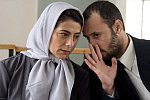 Shadows off the beaten path
Shadows off the beaten pathLOVE AND HONOUR | MOSCOW, BELGIUM
< < F O R E I G N > >
last update 2.Jan.09
See also: SHADOWS FILM FESTIVAL
 R E V I E W B Y R I C H C L I N E
R E V I E W B Y R I C H C L I N E MUST
MUST  SEE
SEE
scr Suha Arraf, Eran Riklis
with Hiam Abbass, Ali Suliman, Rona Lipaz-Michael, Doron Tavory, Smadar Yaaron, Tarik Kopty, Loai Nofi, Hili Yalon, Danny Leshman, Linon Banares, Ayelet Robinson, Makram J Khoury
 release Isr 27.Mar.08,
release Isr 27.Mar.08, UK 12.Dec.08
08/Israel 1h46
BERLIN FILM FEST
 It's not easy to make a personal drama in Israel that doesn't quickly become overwhelmed in politics, but this film cleverly balances both elements to tell a thoroughly involving, moving story that has a potent political kick.
It's not easy to make a personal drama in Israel that doesn't quickly become overwhelmed in politics, but this film cleverly balances both elements to tell a thoroughly involving, moving story that has a potent political kick.
Salma (Abbass) is a Palestinian widow quietly going about her life, tending the lemon orchard that has been in the family for 50 years. But when the new Israeli Defense Minister (Tavory) moves in across the road, he brings a phalanx of jittery secret service guards who see the orchard as a potential terrorist threat. His wife (Lipaz-Michael) loves the trees but is unable to help. And instead of accepting what the military says, Salma hires a lawyer (Suliman) and puts the government on trial.
By keeping the focus tightly on the characters, the filmmakers are able to provocatively probe some heavy issues without getting pushy about it. And while the plot is pretty serious, the story's told with a lightness that allows plenty of observational humour and wry irony to come through. What emerges is a gripping, engaging tale of a powerless woman who takes on a ruthless system. The injustice of her situation is forcefully depicted, as is her tenacious refusal to give up.
Abbass is terrific in the role, standing in the middle of a terrible situation saying, "I won't let them touch my trees," even though there's not much she can do. Especially in a society that routinely tramples on the rights of her ethnic group, which has its own demanding rules and expectations. As her case becomes an international story, her resolute dignity is inspiring. Meanwhile, her chemistry with the charming Suliman is subtle and beautifully revealed. And her interaction with Lipaz-Michael is cleverly developed, mainly limited to glances that are full of both accusation and yearning.
Around the personal drama, director Riklis gently portrays a realistic environment of checkpoints and military intervention that affect both the Palestinians and the Israelis. There's a lovely sense that this whole issue would be resolved if these two women were just allowed to talk to each other. But how can you fight injustice when everything is declared a state of emergency?
25.Nov.08
 R E V I E W B Y R I C H C L I N E
R E V I E W B Y R I C H C L I N E MUST
MUST  SEE
Låt den Rätte Komma in
SEE
Låt den Rätte Komma in
scr John Ajvide Lindqvist
with Kåre Hedebrant, Lina Leandersson, Per Ragnar, Henrik Dahl, Karin Bergquist, Peter Carlberg, Ika Nord, Patrik Rydmark, Rasmus Luthander, Karl Robert Lindgren, Cayetano Ruiz, Mikael Rahm

release Swe/US 24.Oct.08,
UK 17.Apr.09
08/Sweden 1h54
Critics Award:

TORONTO FILM FEST
See also:
LET ME IN (2010)
 Brilliantly shot and directed, this preteen vampire movie has more bite in any scene than all of Twilight put together. It's inventive, involving and utterly unnerving in all the right ways.
Brilliantly shot and directed, this preteen vampire movie has more bite in any scene than all of Twilight put together. It's inventive, involving and utterly unnerving in all the right ways.
In a wintry 1982 Stockholm suburb that's being terrorised by a series of grisly murders, Oskar (Hedebrant) is a fragile 12 year old who's horribly bullied by a schoolroom thug (Rydmark) and his gang. When he meets another outsider, his neighbour Eli (Leandersson), their friendship is reluctant on both sides, but also undeniable. Oskar slowly begins to realise Eli's secret: that she's been 12 "for a long time", she can't stand the sun, she must be invited into a room and she needs blood to live. And this doesn't scare him off at all.
Director Alfredson skilfully makes the film both tender and horrific at the same time, cleverly playing with depth of field, camera movements, editing and points of view to get far under the skin of the characters. It's dark and moody from the opening shot, with evocative music that builds a suggestively nasty tone, while also finding both dark humour and raw humanity in each scene. He's unafraid to show the real viciousness of both bullying and bloodletting while undercutting it all with a jarring sense of sadness.
There are bracingly original touches at every level of this film, with sharp parallels between characters, vivid emotional resonance, heartbreaking tragedy and palpable fear. And at the centre are these two beautifully played lonely children with extremely private issues and obsessions. The neighbours chatter incessantly; Oskar's parents are absent in every sense of the word; Eli has an inept older man (Ragnar) trying to care for her. In other words, the everyday horrors are just as intense as the more surreal ones.
As the film turns increasingly creepy, the plot meanders on its way to the end. But even this adds to the story's emotional kick. It's the little things that stick in our minds: Eli's desperate attempts to be human, Oskar's quiet resilience and the way they find a difficult sort of redemption by looking way past their differences. This is bold, haunting filmmaking that pulls us all the way in.
23.Dec.08
 R E V I E W B Y R I C H C L I N E
R E V I E W B Y R I C H C L I N E
scr Yoji Yamada, Emiko Hiramatsu, Ichiro Yamamoto
with Takuya Kimura, Rei Dan, Takashi Sasano, Nenji Kobayashi, Mitsugoro Bando, Ken Ogata, Kaori Momoi, Makoto Akatsuka, Toshiki Ayata, Koen Kondo, Nobuto Okamoto, Tokie Hidari

release Jap 1.Dec.06,
US 2.Nov.07,
UK 12.Dec.08
06/Japan 2h01
BERLIN FILM FEST
 With the third film in his Samurai Trilogy, after THE TWILIGHT SAMURAI (2002) and THE HIDDEN BLADE (2004), veteran director Yamada continues to examine issues of duty and loyalty, sharply using matter-of-fact period detail and deep characterisations.
With the third film in his Samurai Trilogy, after THE TWILIGHT SAMURAI (2002) and THE HIDDEN BLADE (2004), veteran director Yamada continues to examine issues of duty and loyalty, sharply using matter-of-fact period detail and deep characterisations.
Shinnojo (Kimura) is a low-level samurai, working as a food taster for a feudal lord. His happy life with his wife Kayo (Dan), their young son and a faithful aging assistant (Sasano) is upended when Shinnojo ingests poison on the job and goes blind. His personal despair deepens further when he discovers that his family has pushed Kayo into a relationship with the conniving Shimada (Bando), who has the power to keep them safe. And when he finds out, Shinnojo decides to take action against all odds.
With his straightforward, unfussy style of filmmaking, Yamada helps us immediately identify with the internal issues this young family is facing. Early on, Shinnojo talks about leaving the menial samurai job to open his own dojo, following his heart's desire rather than the demands of a decaying culture. His rapport with Kayo is teasing and respectful, with a real-life edge that catches us by surprise. And as events twist and turn, their actions and reactions are hugely involving.
Kimura and Dan play these tensions beautifully, especially when they begin telling lies out of a desire to protect each other from pain. Some scenes are funny or earthy, while others are utterly wrenching. Through it all, there's a recognisable sense that these flawed people are caught in events they can't control and are just trying to do their best. And even with the historical setting, we see modern-day parallels everywhere. It feels like a thoroughly contemporary story.
To accomplish this, Yamada fills scenes with humour and biting snobbery, while the cast members add details that raise sharp interest even in scenes about their dull routines. And as the story progresses, it gets increasingly intense and dark, with a real sense both of raw desperation and steely resolve. The fight sequences bristle with energy and violence, but never slip into cliches. This may annoy audiences who want to see whirling samurai sword action. But honestly, an emotional kick is always more satisfying.
1.Dec.08
 R E V I E W B Y R I C H C L I N E
R E V I E W B Y R I C H C L I N E Aanrijding in Moscou
Aanrijding in Moscou
scr Jean-Claude Van Rijckeghem, Pat van Beirs
with Barbara Sarafian, Jurgen Delnaet, Johan Heldenbergh, Anemone Valcke, Sofia Ferri, Julian Borsani, Bob De Moor, Jits Van Belle, Camille Friant, Griet van Damme, Frederik Imbo, Suzy Van Herbergen
 release Bel 30.Jan.08,
release Bel 30.Jan.08, US 19.Dec.08,
UK 13.Feb.09
08/Belgium 1h42
CANNES FILM FEST
 A warmly comical undertone keeps this romantic drama from wallowing in its serious themes, looking at a woman on the verge of middle age without a clue what to do with her life. Even if it meanders a bit, it's sharply well-acted and involving.
A warmly comical undertone keeps this romantic drama from wallowing in its serious themes, looking at a woman on the verge of middle age without a clue what to do with her life. Even if it meanders a bit, it's sharply well-acted and involving.
Matty (Sarafian) is a middle-aged mother of three: 17-year-old Vera (Valcke) and pre-teens Fien and Peter (Ferri and Borsani). Her husband Werner (Heldenbergh) has moved in with his young mistress, but Matty wants him back. Then in a car park mishap she meets the 29-year-old truck driver Johnny (Delnaet), who begins to charm her against the odds. Even when she discovers his dark past and hot temper, she's still surprised by the way he makes her feel. So when Werner asks to come back, she's not so sure what to do.
The filmmakers use a generous amount of humour, some of it very black, to keep us engaged with the story and characters. Most scenes are played in a slightly exaggerated style for laughs, even though what's happening is pretty serious. It's brittle and dry, and often very funny as the actors adeptly create characters who are bundles of insecurities, crushed hopes and yearnings for happiness.
At the centre, Sarafian keeps us hooked with her grumpy face, which glows with youthful energy when she smiles. These transformations are terrific on-screen, and help us understand Matty's inner turbulence. Through various situations and encounters, everything seems to point to death (the film has a definite Scandinavian tone about it), but just when she begins to give up hope, something reels her back in.
Things kind of wobble in the middle, with all the to-ing and fro-ing. As we learn more, we can see why her decision is so difficult, but we just want her to stop dithering and pick one of these flawed men. Or perhaps to decide to go it alone. One surprising revelation regarding one of her children doesn't really work (it's over-constructed, so rather obvious). But the filmmakers manage to balance the harsh realities with a gentle sense of humour in a remarkably likeable way.
20.Nov.08


See also: SHADOWS FILM FESTIVAL
© 2009 by Rich Cline, Shadows
on the Wall